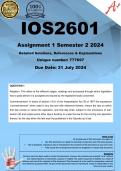IOS2601
Assignment 1 Semester 2 2024
Detailed Solutions, References & Explanations
Unique number: 777697
Due Date: 31 July 2024
QUESTION 1
Adoption: This refers to the different stages, readings and processes through which legislation
has to pass before it is accepted and issued by the legislative body concerned.
Commencement: In terms of section 13(1) of the Interpretation Act 33 of 1957 the expression
“commencement” when used in any law and with reference thereto, means the day on which
that law comes or came into operation, and that day shall, subject to the provisions of sub-
section (2) and unless some other day is fixed by or under the law for the coming into operation
thereof, be the day when the law was first published in the Gazette as a law.
Terms of use
By making use of this document you agree to:
• Use this document as a guide for learning, comparison and reference purpose,
• Not to duplicate, reproduce and/or misrepresent the contents of this document as your own work,
• Fully accept the consequences should you plagiarise or misuse this document.
Disclaimer
Extreme care has been used to create this document, however the contents are provided “as is” without
any representations or warranties, express or implied. The author assumes no liability as a result of
reliance and use of the contents of this document. This document is to be used for comparison, research
and reference purposes ONLY. No part of this document may be reproduced, resold or transmitted in any
form or by any means.
, +27 67 171 1739
QUESTION 1
Adoption of Legislation
Adoption refers to the formal process through which a proposed piece of legislation
(a bill) is scrutinized, debated, and ultimately approved by the legislative body. The
stages of adoption include:
1. Drafting and Introduction: A bill is drafted and introduced to the legislative
body.
2. Readings and Debates: The bill goes through several readings and debates
in the legislative body. These stages allow lawmakers to discuss, amend, and
refine the bill.
3. Committee Consideration: The bill is often referred to a committee for detailed
examination and recommendations.
4. Voting: The legislative body votes on the bill. If the bill passes the vote, it moves
forward in the legislative process.
5. Presidential or Premier Assent: Once the bill has been passed by the
legislative body, it must be signed by the President (for national legislation) or
the Premier of a province (for provincial legislation) to become an Act of
Parliament or a Provincial Act.
The procedures for adopting Acts of Parliament and Provincial Acts are outlined in
Chapters 4 and 6 of the Constitution of South Africa. Upon signing, the bill becomes
law, but it does not yet come into operation.
Commencement of Legislation
Commencement refers to the point in time when a law that has been adopted and
signed comes into effect and is enforceable. According to Section 13(1) of the
Interpretation Act 33 of 1957, the term "commencement" is defined as follows:
1. Default Rule: A law comes into operation on the day it is first published in the
Government Gazette unless another date is specified.
Disclaimer
Extreme care has been used to create this document, however the contents are provided “as is” without
any representations or warranties, express or implied. The author assumes no liability as a result of
reliance and use of the contents of this document. This document is to be used for comparison, research
and reference purposes ONLY. No part of this document may be reproduced, resold or transmitted in any
form or by any means.





